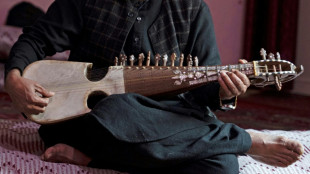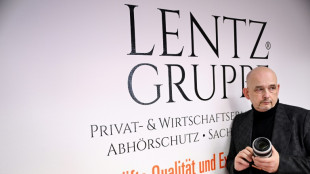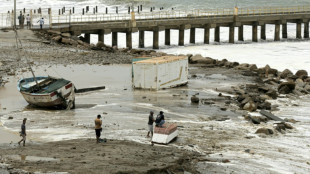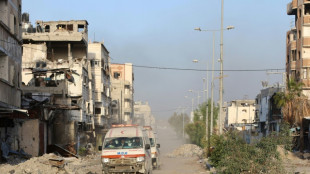
-
 Brunson's 55 points propel Knicks to overtime win over Wizards
Brunson's 55 points propel Knicks to overtime win over Wizards
-
Drama, dreams: Japan's wildly popular school football breeds future stars

-
 Plane with 181 on board crashes in South Korea, killing 47
Plane with 181 on board crashes in South Korea, killing 47
-
Georgia set to inaugurate disputed president amid political crisis

-
 Japan's Wajima craftmakers see hope in disaster-hit region
Japan's Wajima craftmakers see hope in disaster-hit region
-
Five events to look out for in 2025

-
 Five sports stars to watch in 2025
Five sports stars to watch in 2025
-
Plane with 181 on board crashes in South Korea, killing 29

-
 UNESCO-listed musical instrument stifled in Afghanistan
UNESCO-listed musical instrument stifled in Afghanistan
-
Excited Osaka says 'deep love' of tennis keeps her going

-
 Baseball superstar Ohtani expecting first baby
Baseball superstar Ohtani expecting first baby
-
For German 'sick leave detective', business is booming

-
 Konstas, Khawaja fall as Australia extend lead to 158 over India
Konstas, Khawaja fall as Australia extend lead to 158 over India
-
Impressive Herbert leads Chargers into playoffs, Broncos denied

-
 One dead in Ecuador, Peru ports closed amid massive waves
One dead in Ecuador, Peru ports closed amid massive waves
-
NBA hand out suspensions after fracas in Phoenix

-
 Atalanta snatch late draw at Lazio to hold Serie A lead
Atalanta snatch late draw at Lazio to hold Serie A lead
-
Trump sides with Musk in right-wing row over worker visas

-
 Suriname rules out state funeral for ex-dictator Bouterse
Suriname rules out state funeral for ex-dictator Bouterse
-
Israeli military says Gaza hospital chief held in raid

-
 Alisson tells title-chasing Liverpool to create own history
Alisson tells title-chasing Liverpool to create own history
-
Israel army says ends raid against 'Hamas centre' in north Gaza hospital

-
 French skier Sarrazin 'stable' after surgery for crash injuries: federation
French skier Sarrazin 'stable' after surgery for crash injuries: federation
-
Jansen admits South Africa face challenge after losing three wickets

-
 Israeli military confirms north Gaza hospital chief held in raid
Israeli military confirms north Gaza hospital chief held in raid
-
Abbas, Shahzad rock South Africa at start of chase

-
 US deported record 61,680 Guatemalans in 2024: agency
US deported record 61,680 Guatemalans in 2024: agency
-
Double centurion Shah inspires Afghanistan fightback in Zimbabwe

-
 Diallo wants to make 'history' with struggling Man Utd
Diallo wants to make 'history' with struggling Man Utd
-
Evergreen Brignone wins giant slalom to end Semmering drought

-
 Putin apologises to Azerbaijan without claiming responsibility in plane crash
Putin apologises to Azerbaijan without claiming responsibility in plane crash
-
Guardiola won't quit troubled Man City

-
 Gaza child amputees get new limbs but can't shake war trauma
Gaza child amputees get new limbs but can't shake war trauma
-
Evergreen Brignone powers to Semmering giant slalom win

-
 Thousands in Georgia human chain as pro-EU protests enter 2nd month
Thousands in Georgia human chain as pro-EU protests enter 2nd month
-
Turkey's pro-Kurd party meets jailed PKK leader

-
 WHO chief says narrowly escaped death in Israeli strikes on Yemen airport
WHO chief says narrowly escaped death in Israeli strikes on Yemen airport
-
Swiss Monney takes maiden World Cup win in Bormio downhill

-
 De Minaur wins but Australia crash to Argentina at United Cup
De Minaur wins but Australia crash to Argentina at United Cup
-
EU universal charger rules come into force

-
 Evenepoel targets return in time for Ardennes classics
Evenepoel targets return in time for Ardennes classics
-
Duffy bowls New Zealand to T20 victory over Sri Lanka

-
 Turkey's pro-Kurd party to meet jailed PKK leader on Saturday
Turkey's pro-Kurd party to meet jailed PKK leader on Saturday
-
Gaza hospital shut after Israeli raid, director held: health officials

-
 Surgery for French skier Sarrazin 'went well': federation
Surgery for French skier Sarrazin 'went well': federation
-
Mitchell, Bracewell boost New Zealand in Sri Lanka T20

-
 Kyrgios says tennis integrity 'awful' after doping scandals
Kyrgios says tennis integrity 'awful' after doping scandals
-
S. Korean prosecutors say Yoon authorised 'shooting' during martial law bid

-
 Vendee Globe skipper Pip Hare limps into Melbourne after dismasting
Vendee Globe skipper Pip Hare limps into Melbourne after dismasting
-
Reddy's defiant maiden ton claws India back into 4th Australia Test

| RBGPF | 100% | 59.84 | $ | |
| RELX | -0.61% | 45.58 | $ | |
| NGG | 0.66% | 59.31 | $ | |
| RIO | -0.41% | 59.01 | $ | |
| BCC | -1.91% | 120.63 | $ | |
| RYCEF | 0.14% | 7.27 | $ | |
| BCE | -0.93% | 22.66 | $ | |
| GSK | -0.12% | 34.08 | $ | |
| BTI | -0.33% | 36.31 | $ | |
| CMSC | -0.85% | 23.46 | $ | |
| CMSD | -0.67% | 23.32 | $ | |
| BP | 0.38% | 28.96 | $ | |
| AZN | -0.39% | 66.26 | $ | |
| VOD | 0.12% | 8.43 | $ | |
| JRI | -0.41% | 12.15 | $ | |
| SCS | 0.58% | 11.97 | $ |

Gaza child amputees get new limbs but can't shake war trauma
Layan Al Nasr, 14, thought she would never walk again after both of her legs were amputated following an Israeli bombing in Gaza one year ago.
Now, she stands proudly on artificial limbs fitted in the United Arab Emirates. But fear for her family, still living under the attacks, gnaws away.
"When I was told about prosthetics when I arrived, I didn't even know they existed," she jokes, taking a few steps supported by crutches.
She is able to smile as she describes her operations, rehabilitation and her newfound hope. But emotion eventually catches up with her.
"What scares me today is losing my brothers, my sisters and my father," she confides, bursting into tears.
Nasr is one of more than 2,000 wounded or seriously ill Palestinians flown with their closest relatives to the oil-rich UAE during the Israel-Hamas war.
Plucked from shattered Gaza, much of it in ruins, they are lucky to escape a conflict that has left more than 45,000 people dead in the Palestinian territory.
The war was triggered by militant group Hamas's October 7, 2023 attack that resulted in 1,208 deaths on the Israeli side, mostly civilians, according to an AFP tally of Israeli official figures.
However, the survivors brought to the UAE are haunted by their memories of war and their terror of losing loved ones, despite their new existence in calm, quiet Abu Dhabi.
"I don't care what happens to me, the important thing is that nothing happens to them," insists Nasr.
- Psychological impact -
The complex housing them in the UAE capital has a school, mosque, grocery store and a hairdresser, as well as a care centre offering physiotherapy, speech therapy and counselling.
"Thanks to the prosthetics and the care provided, patients have regained their autonomy," says physiotherapist Mustafa Ahmed Naji Awad.
But the hardest thing to treat is the psychological impact, he admits.
Faten Abu Khoussa, who came with her 10-year-old daughter Qamar, can testify to this.
The little girl was caught in an air raid in Gaza when she went out to buy a packet of crisps, losing a leg from her injuries.
Qamar's spirits have gradually improved over time, but "it remains very difficult for her. She loved nothing more than playing on her scooter", says her mother.
"She feels alone without her brothers and sisters" who have fled to Egypt, Abu Khoussa adds.
The single mother, now separated from the other children she has been raising since her husband's death, is desperately trying to reunite her family in the UAE.
Until then she feels her life is "suspended", leaving her unable to plan for the future.
The Emirati authorities say the afflicted Palestinians and their family members will be asked to return home when conditions allow.
Ahmad Mazen, 15, who came with his mother to have a lower-leg prosthesis fitted, was looking forward to being reunited with his father and brother.
But shortly after his arrival, he learned that they had been killed in a bombing raid.
His only consolation is football, his passion, and the "indescribable feeling" of finally being able to kick a ball again, he says.
M.Ouellet--BTB
